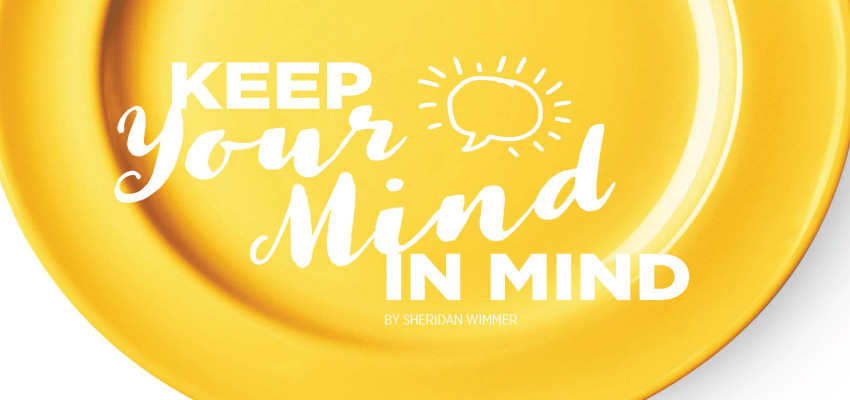By Sheridan Wimmer on August 17, 2018
Keep Your Mind in Mind

These days, we all have a lot on our plates (pun intended). Kids, work, relationships, finances and curveballs in life can take a toll on our health — both physically and emotionally. While physical health is something we talk about nearly daily, emotional health is a tougher topic.
However, the stigma around emotional and mental health is becoming a thing of the past. If you want to feel better, there are steps you can take.
BRAIN GAIN
There are many ways to make sure you’re taking care of yourself, from visiting your physician regularly and exercising to getting a massage on occasion. Being mindful about what we put into our bodies is important as well, because eating the right foods can help our mental state.
“Our brain needs adequate fuel to run the best it can,” Karen Hanson, dietitian for the Johnson County Department of Health and Environment, says. “The brain accounts for 20 to 30 percent of the body’s total energy need and uses 20 to 25 percent of all the glucose or blood sugar that enters the bloodstream.”
The glucose Hanson mentions is the primary fuel for the brain. The human brain is susceptible to oxidative damage, which can lead to inflammation.
“Stress, depression and diseases like dementia are linked to excess inflammation in the body and brain,” Hanson says.
When we think about taking care of our brains, we think about memory games, puzzles or other activities to stretch our thinking power. But like other parts of our body, the brain needs nourishment by way of sustenance. Therefore, eating the right kinds of food will help your mood.
FISH FOOD
Studies have shown Omega-3 fats, such as eicosapentaenoic acid (EPA) and docosahexaenoic acid (DHA) found in salmon, tuna and fish oil supplements, nourish the brain.
“Including three servings per week of fresh or canned sources of these acids can encourage better mental health,” Hanson suggests. “I enjoy making delicious salmon cakes using canned salmon. This is such an easy and simple recipe I can have ready in 20 minutes.”
Omega-3s can also be found in walnuts and other nuts, flax seed (or flaxseed oil) and heart-healthy oils such as olive oil.
NUTRIENT-RICH ANTIOXIDANTS
Eating nutrient-rich foods such as fruits, vegetables, beans and whole grains daily provides important fiber and powerful antioxidants, says Hanson.
“These foods have Vitamins C and E, which help counteract the process of inflammation,” she says. “Try to include two to three servings of whole grains per day like oatmeal, whole wheat products, quinoa or brown or wild rice.”
Whole grains digest slower and provide a gradual release of brain fuel.
Also, when it comes to fruits and vegetables, studies have shown they help protect the brain against excess stress and consumption can lead to a decrease in depression.
THE ESSENTIALS
For some, it’s important to have that cup (or pot) of coffee to get going in the mornings. You’re in luck if you’re one of those people because coffee is a brain-friendly beverage.
“Coffee contains plant-based antioxidants, which have been documented to have cognitive benefits like increased focus, concentration and memory,” Hanson says. “Coffee does all of this while also lifting our mood.”
Freshly-brewed tea is also a good source of antioxidants.
Last, but certainly not least: chocolate. Dark chocolate has high levels of plant chemicals called flavanols, as well as antioxidant power.
“The higher the cocoa level, the better,” Hanson says. “Aim for 70 percent or higher and limit those chocolate cravings to a one-ounce serving per day.”
We also know staying physically active and maintaining a strong cardiovascular system helps our brain stay fit and well-nourished.
There is no one-size-fits-all solution to being mentally and emotionally healthy; find what works for you.
If you or someone you know is struggling with mental health and need immediate help, please talk to someone. The Suicide Prevention Lifeline is available 24/7 at 1-800-273-8255.


